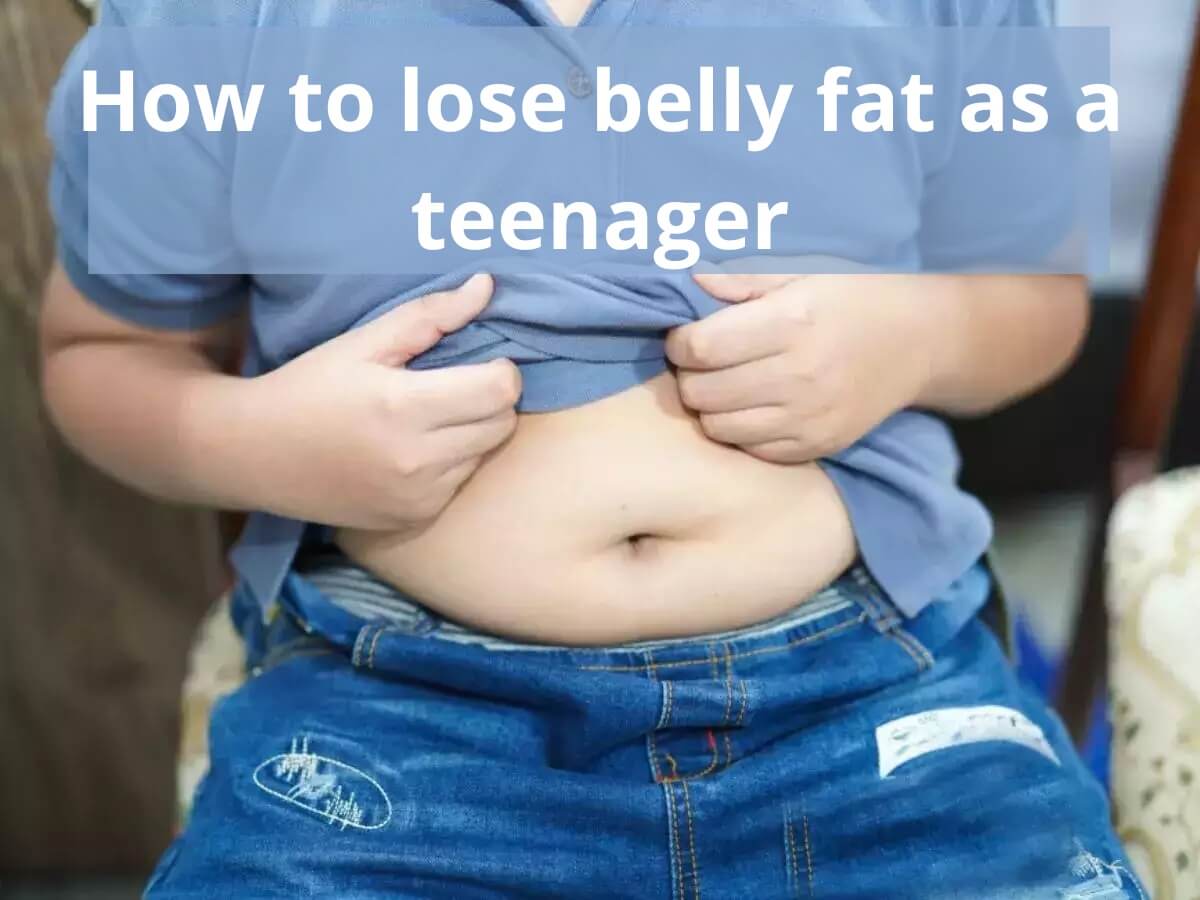How to Lose Belly Fat as a Teenager?

Obesity is a worldwide issue. How to remove belly fat for 13-year-olds is a common concern among today’s teenagers. Having excess belly fat or overweight thighs was mainly confined to adults. But if we glance around, we’ll see that even teenagers are entangled in the confusion these days. Because it is a sign of many dangerous conditions, being overweight is a significant issue.
Teenagers tend to be overly self-conscious about their height, skin tone, clothing, weight, and other physical characteristics. Being overweight as a teenager or having excess thigh or belly fat will always make you feel stressed. Early weight gain is not a desirable thing.
Are you among them? Do you have trouble getting rid of belly fat? Are you want to know How to Lose Belly Fat as a Teenager? You have just arrived at the perfect platform for all the teenagers suffering through this trouble and searching for efficient suggestions and tactics to resolve this issue. If you read through it, you will undoubtedly find a solution to your problem using the information we have gathered for you. So let’s get started.
Healthy Weight Loss Tips for Teens
Even teenagers can benefit from losing weight. Losing extra body fat can enhance health, increase confidence, and improve self-esteem. Teenagers should, however, healthily lose weight by adopting long-lasting dietary and lifestyle modifications that support developing bodies.
Here are some wholesome suggestions for teen weight loss
-
Limit your intake of sweetened beverages.
Reducing your intake of sugary beverages is probably one of the most straightforward strategies to reduce extra weight. There are a lot of added sugars in sodas, energy drinks, sweet teas, and fruit drinks.
According to studies, kids who consume a lot of added sugar may gain weight and be more likely to develop illnesses like type 2 diabetes, nonalcoholic fatty liver disease, acne, and cavities.
According to research, kids are more inclined to drink sugary drinks if their parents do; therefore, limiting these unhealthy beverages as a family is advantageous.
-
Don’t Avoid fat
Children and teenagers require more fat than adults do because of the way their bodies are still changing. Due to their calorie level, sources of dietary fat are frequently eliminated when trying to reduce weight. However, reducing fat consumption excessively can harm development and growth.
Focus on replacing wrong fat sources with good ones rather than substantially cutting your fat intake. Healthy weight loss can be aided by substituting nuts, seeds, avocados, olive oil, and fatty fish with bad fats like those found in deep-fried foods and sugary baked goods.
Healthy fats are essential for good brain development as well as for overall growth, in addition to providing energy for your body.
-
Include vegetables in your diet
Essential nutrients like vitamins, minerals, and fiber are abundant in vegetables. They also contain potent antioxidants, which defend your cells from dangerous free radicals, and unstable molecules that can harm your cells.
In addition to being incredibly nutritious, studies have shown that eating vegetables can assist teenagers in achieving and maintaining a healthy body weight. Because vegetables are so high in fiber and water, eating them might make you feel fuller and more content. Maintaining a constant appetite throughout the day reduces the likelihood of overeating.
-
Avoid Diet Meals
Diet-friendly foods and beverages may contain harmful fats, artificial sweeteners, and other bad health components. Aspartame and sucralose are artificial sweeteners in some studies for health problems like stomach distress, migraines, and even weight gain.
Additionally, diet foods and drinks are frequently highly processed and infrequently include the nutrients that developing bodies require. Choose complete, unprocessed, satisfying foods for meals and snacks instead of buying diet products.
-
Drink enough water
A healthy weight can be maintained, and overall health is improved by drinking adequate water. Water replaces sugary drinks like soda and sports drinks, which lowers calorie intake and promotes healthy weight loss.
Additionally, sipping water regularly can help control appetite and lessen the impulse to munch when you’re not hungry. Maintaining sufficient hydration may enhance both athletic and intellectual performance.
-
Reduce Stress
Stress results in hormonal alterations, such as higher-than-normal amounts of the hormone cortisol, which can stimulate appetite and encourage weight gain. There should be some stress in everyone’s lives, but too much stress can hinder weight loss.
Activities that reduce stress and encourage relaxation include yoga, meditation, gardening, exercise, and spending time outside. Therapists or psychologists are a fantastic source of stress-relieving tactics and can offer help when you’re feeling overwhelmed if you’re feeling unduly anxious.
-
Get Enough Sleep
To keep a healthy body weight, you must get adequate sleep. Adults who don’t receive the necessary seven to eight hours each night of sleep tend to weigh more, as per studies. Teenagers require considerably more rest than adults do. To perform at their best, doctors advise kids to acquire 9 to 10 hours of sleep daily.
Ensure your bedroom is dark and minimize distractions like watching television or using your smartphone before bed to enjoy a sound sleep.
-
Don’t Compare Yourself to Others
Anyone’s body image can be negatively impacted by feeling compelled to appear a specific way, but kids seem particularly vulnerable. Celebrities, social media, and peer pressure may make teenagers unsatisfied with their bodies.
It’s critical to recognize that everyone’s body is different and loses weight at a different rate when attempting to become healthier by decreasing extra weight. Never let the desire to appear a certain way prompt you to start a weight loss quest. The goal of weight loss should be to improve one’s health, happiness, and sense of self.
Avoid holding yourself to unachievable ideals. Instead, encourage your new healthy lifestyle with body positivity and self-empowerment.
-
Mindful Eating Practices
To improve your connection with eating, body awareness, and food regulation, mindful eating entails paying attention to your food. Teenagers frequently consume meals and snacks while on the go, watching television, or using a smartphone, which can result in overeating.
Mindful techniques such as chewing food thoroughly, eating slowly, and savoring meals while seated at a table can help control weight and foster a healthier connection with food. Healthy body weight may also be supported by mindful eating, which, according to research, might assist teenagers in making less impulsive food decisions.
Parents and siblings should also engage in mindful eating to assist teenagers in attempting to adopt healthy eating practices.
-
Set sensible, realistic goals
Being healthier can be attained by losing extra body fat. Nevertheless, it’s crucial to set reasonable weight and body-image objectives. Although overweight kids need to lose excess body fat, the priority should constantly be enhancing health, not body weight.
For some teenagers, setting a reasonable weight target can be helpful, but overall, changing diet and upping physical activity can be far more beneficial. Teens need to see positive role models and know that everyone has a different body type.
Teen weight loss success is linked to family support and education at home and school, which can assist in healthy lifestyle choices.
End Words by the writer
Teenagers’ health, self-esteem, and general quality of life can all be enhanced by losing extra body weight. To achieve your objectives, it’s crucial to follow safe, healthy weight loss strategies.
Teenagers can lose weight quickly and successfully by cutting out on added sweets, exercising regularly, and eating healthy foods. Teenagers should remember that achieving a certain weight or fitting into a specific size does not equate to having a healthy body.
Some of the best strategies to achieve optimal health include nourishing your body with healthy foods, caring for it through exercise, and loving yourself.
Frequently Asked Questions (FAQs) How to Lose Belly Fat as a Teenager?
Can a teenager have belly fat?
Visceral fat, the deep “hidden” fat that surrounds the abdominal organs and is particularly associated with type 2 diabetes, high blood pressure, and heart diseases, was found to be more prevalent in 612 men between the ages of 18 and 20 whose body mass index (BMI) increased the most during adolescence.
How long does it take for a teenager to lose belly fat?
For many dieters, losing stubborn belly fat is one of the most challenging and slowest locations to notice improvement. A calorie deficit is created by eating less and exercising more for at least 6 to 12 weeks to lose belly fat and have a flat tummy.
What is overweight for a 14-year-old?
Overweight is defined as a BMI of 25 to 29.9. Obesity is defined as anything over 30. The average BMI ranges from 18.5 to 24.9.
Which exercise burns belly fat the fastest?
Crunches are the best exercise for burning belly fat. When it comes to workouts that burn fat, crunches come in first. Begin by lying flat on your back with your knees bent and your feet resting on the ground.
References
https://www.healthline.com/health/exercise-fitness/how-to-do-crunches
https://www.healthline.com/nutrition/weight-loss-for-teens
https://www.livestrong.com/article/516599-how-to-lose-stomach-fat-for-male-teens/
https://www.livestrong.com/article/124446-teen-girls-lose-belly-fat/
https://www.wikihow.com/Lose-Belly-Fat-(Teen-Girls)
https://vixendaily.com/fitness/easy-tips-for-teens-to-lose-belly-fat-fast/
https://kidshealth.org/en/teens/lose-weight-safely.html
https://healthfully.com/10-ways-for-teens-to-quickly-lose-belly-weight-7383647.html





